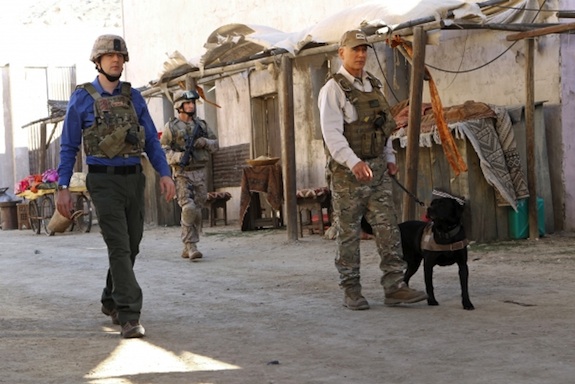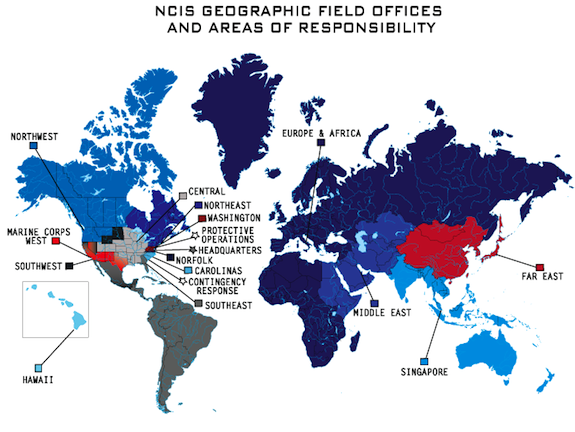What Is It Really Like to Work at the NCIS?
A division chief and special agent talk about the challenges and rewards of fighting crime across the world
![]()

Like the fictional agents on the CBS show, NCIS officials travel the world solving crimes. Courtesy of CBS
Though the long-running CBS television show, “NCIS,” is based on the real-life activities of the Naval Criminal Investigative Service, Lou Eliopulos, NCIS division chief of forensic sciences, would rather compare his work to another show: “Chef Gordon Ramsay’s Kitchen Nightmares.”
“If you ever watch, Ramsay in the kitchen where he comes in and analyzes a restaurant, we’ll do the same thing,” he says of the organization’s case work.
The job is a bit more complicated than inattentive wait staff and messy prep stations. A team of 1,876 special agents travel the world solving everything from violent crimes to espionage plots. Though they are specifically tasked with working with the Navy, the group’s global reach and special technological expertise means law enforcement agencies often ask NCIS to partner with them on difficult investigations. Unlike other military investigative branches, NCIS is almost entirely civilian, meaning they’re able to operate in the civilian world of law enforcement much more freely.
Occasionally, NCIS calls on the Smithsonian to help crack a case. “If we have a tough case or a tough question, we go to the best,” says Eliopulos. In particular he says, the Institution’s anthropological expertise aids in identifying skeletal remains, a critical part of the investigation that helps agents understand the timeline of and activities surrounding the crime.
Eliopulos and special agent David Lobb stopped by the Institution for a sold-out Smithsonian Associates event Wednesday, but we spoke with them by phone to bring you the behind-the-scenes story about the job’s challenges and rewards.
What are the challenges of the job?
LE: The entire job is a challenge, it’s unique. When you talk about cold cases, for example, those are cases no one else has solved. If they were easy, they would have been solved. So you’re working cases that are difficult to resolve, that have resisted solving for years and years. You have problems associated with witnesses memories and evidence, so that presents a challenge yet we’ve been tremendously successful not only in our own cases involving 64 cases since we started the cold case program but we go out and train three times a year for local law enforcement and stage agencies. And they’ve been successful using our methods. That’s one of the great benefits of working for NCIS, our job is different, and it’s very challenging, and that’s one of the reasons that drew me here to begin with.
DL: I agree. The expectation that’s levied on our agents and our professional staff is great. You talk about taking a special agent and dropping them in a foreign country, where they’re working and they’re there to support a Navy ship or an exercise that’s taking place in that country, and their job is to meet the local law enforcement, the mayor or the local governor of that region or that country and ensure the safety of the personnel coming into that country and making a call if they think it’s not safe.
Most common misconception?
DL: The biggest eye-opener is how much writing you do. For all the fun stuff you see on TV and for all the fun stuff you get to do in the field, there’s paperwork and other things that go with that, which is an important part of documenting your cases and seeing them through to prosecution.
LE: For me, it’s having everything readily available. . .It’s a little bit more work involved. We are not really permitted to tap into the CIA databases and other databases like that to obtain information.
Do you have a favorite case?
LE: I’ve never won a Super Bowl, I’ve never won a World Series, but when you solve a case it’s got to rival that feeling. That’s like trying to decide which child you like best.
Any one of us that has ever stood over a dead body or put a body into a body bag, that’s ever made the notification of next of kin and heard that primal scream that you can’t hear or duplicate anywhere else, it literally stands that hair up on the back of your neck and to be able to sit there and unravel that mystery and put the case together. . .being able to get the conviction, it would be hard to rival.
We just had a recent case; 28 years unsolved of a ten-year-old that was abducted, a Navy dependent. While her family was moving and her dad is deployed, someone comes and abducts this child and rapes and murders her and we literally had no suspects. Since 1999 we’ve worked the case as a cold case and waited for our first break, knowing that we were due one. Through the different forms of DNA testing and latest technology, we were able to resolve that and going to tell the parents that we made an arrest on the case, all of those are tremendous achievements for our agency.
What was their reaction?
LE: When I came in to talk with them, it had been ten years since we had spoken last. I had already known an arrest was made about 30 minutes before. I went through the process of everything we did in the past ten years, it took about 20 to 25 minutes to go through that. I could see the parents listening to all this, like, here’s the excuses and more excuses and 28 years and it’s still unsolved. Then I told them we did Y-STR and we identified the killer, and he was just arrested, and literally you saw the mom’s jaw just drop to her chest and you could see their eyes welling up with tears.
They made me repeat the news and I went into the details. They spoke to me about this person that was arrested and that they knew them. The dad actually has cancer now and I asked if they had any questions and the mom said, “I just have one.” I said, “What’s that?” And she said, “Can I hug you?” I said, “Absolutely and I want the big guy over there to hug me too.”
And your favorite case?
DL: One that stands out for me was a terrorism case that I worked. . .This was an interesting case because it was an insider situation where we had a Muslim convert on one of our Navy ships, who had been turned to extremism. We’re not sure exactly why. He began giving and selling classified information about the movement of the ship and its vulnerabilities to two al-Qaeda financiers and operators in London, with the hope that they would be able to use that to plan an attack on one of our Navy vessels. . .Through years of work and joint work with the FBI we were able to, in 2007, arrest the individual and have him sentenced a year later. He’s serving ten years in federal prison on an espionage charge in New York.
He hasn’t told us much about why he joined the Navy in the first place, that’s one of the things that we continue to monitor as we look at the threat of an insider, and what they can do to damage and bring down our own military. It was an eye-opener for a lot of folks.
When the captain of the ship. . .learned about this, his immediate concern was: ‘How many other people do I have that are trying to do this?’ And the Navy’s concern is: “How many people in the Navy are trying to do this?” You can imagine the pressure that that, then, puts on our agency to make sure that we’re watching those things, and covering those gaps, and it’s a difficult thing to do.
/https://tf-cmsv2-smithsonianmag-media.s3.amazonaws.com/accounts/headshot/Leah-Binkovitz-240.jpg)

/https://tf-cmsv2-smithsonianmag-media.s3.amazonaws.com/accounts/headshot/Leah-Binkovitz-240.jpg)